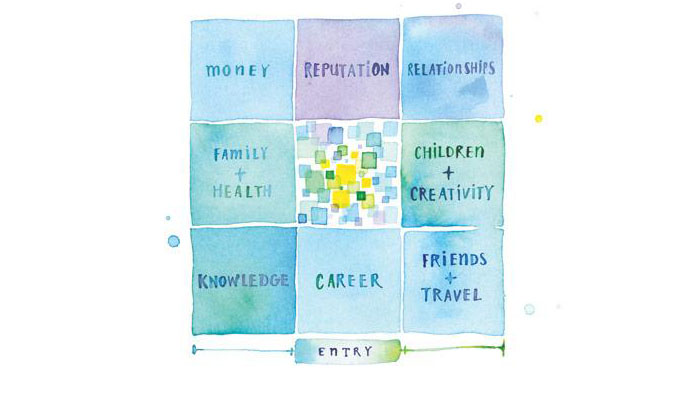Feng Shui for your Home

Feng Shui is a Chinese philosophical system of harmonizing everyone with the surrounding environment. It is closely linked to Daoism. The term feng shui literally translates as “wind-water” in English.
The house for a person is one of the basic subjects to feel protected and successful. We decorate our houses with love and according to our intuition. Our house is our fortress. This is a place where we have a rest, sleep and muster our strength. This place should be very pleasant, harmonious, and comfortable. Every room has peculiarities in balancing energies, so read the doctrine carefully. You should know your individual feng shui map to harmonize the energies of your lodging correctly.
Stand inside your home with your back to the front door. Look forward. The part of your home in the far left corner is the money sector. The far-right corner is the relationship zone. Got it? You work the magic by placing certain items in certain zones; some have symbolic power, others a literal connection to the area.
Feng shui is based on knowledge to make our homes comfortable and harmonious. At a close sight, you will find out the similarity between your intuition and this knowledge. Take the privilege of feng shui knowledge to balance your house with the earth’s energy.
Here are some general feng shui tips for your house
– keep all areas of your house and garden free of clutter for easy chi flowing.
– every subject at home should be loved by you if others get rid of it.
– place a merchant ship at a place where you need a water element. Merchant ships are excellent symbols of prosperity. Your ship can`t bring you luck if it`s empty. Fill it up with cargo, money, gold bars (real or fake), ingots, jewelry, loose gemstones, crystals, semi-precious stones, faux diamonds, pearls, etc.
– everything should be in working condition, without cracks and splits, if others get rid of it.
– your main door must be positive for your color and must be in one of the best directions for you according to your individual feng shui map.
– your bedroom should be as far as possible from the main door.
– every premise must be organized according to your individual feng shui map and all sectors should be balanced with special enhancers.
– your life in the house will be happy and prosperous when you practice positive thinking, get acquainted with the bases of positive thinking.
– always keep the toilet lid down while not in use. It stops the money from going down the drains.
– keep brooms, mops, and trash bins out of sight. It is important for the family’s well-being.
– use wind chimes on the main doors of your house will distract the negative energy from entering the house.
Feng Shui enthusiasts use “cures” for everything from finding love to winning the lottery. And while adding plants and wind chimes to strategic spots can attract fortune, what you don’t do can often be as important as the actions you do take.
Suggested Read: Feng Shui Tips for Luck
10 biggest Feng Shui mistakes you can make, and how to fix them.
-
Enter your home through the front door. Your front door governs your career and Lifepath. When you enter your home through the garage or back door, you lose sight of your life’s purpose. Job opportunities dry up and aimlessness sets in. Get into the habit of using the front door at least once a day, even if you have to go out of your way to do so.
-
Keeping exercise equipment in the bedroom. The bedroom should evoke play, not work. Storing your Stairmaster in the boudoir will make relationships arduous and exhausting. Move your exercise machine to another part of the house. If you want to work out in the bedroom, do it between the sheets! Increase love in home
-
Allowing clutter to accumulate. Musty newspapers, dirty laundry, and piles of toys can weigh you down, both physically and emotionally. Tidy up at least once a week to restore your health.
-
Keeping hall closets jammed to overflowing. Hall closets represent your capacity to be receptive. Keeping yours stuffed with sports equipment, off-season clothing, and sundry junk will cut you off from helpful people. Clear out these spaces so they are one-third empty, then wait for burdens to lift.
-
Leaving walls bare and lifeless. Blank walls make it difficult to abandon yourself to pleasure. Take the time to fill your home with artwork that uplifts and inspires you. At the very least, apply colorful paint or paper to the walls.
-
Leaving the toilet seat up. Women have been complaining about this phenomenon for years … and with good reason. Toilets are drains that can suck wealth right out of your life. Get into the habit of keeping the lid down when the toilet is not in use.
-
Not washing windows. If you don’t do windows, you won’t do much else, either. That’s because windows are connected to your fame and reputation. When they’re clear and sparkling, people will recognize and celebrate your talent. When they’re dirty and dim, those golden opportunities will keep passing you by.
-
Ignoring squeaky hinges. Doors that moan and groan can make you inflexible. A few drops of WD-40 will loosen up more than your hinges.
-
Never cooking. Your kitchen is the heart of your home. When it lies stagnant, all areas of your life will suffer. The more you cook at home, the happier and healthier you will be. If you can’t cook, be sure to ignite the burners on your stove at least once a day to generate warmth and vitality.
-
Hanging on to unwanted family heirlooms. Grandma willed you her favorite brown afghan that smells of mothballs and clashes with everything you own. Whether you’ve draped it over the couch or relegated it to a cardboard box, this legacy is keeping you mired in the past. Get rid of undesired gifts and move on. Also, read Feng shui for office






